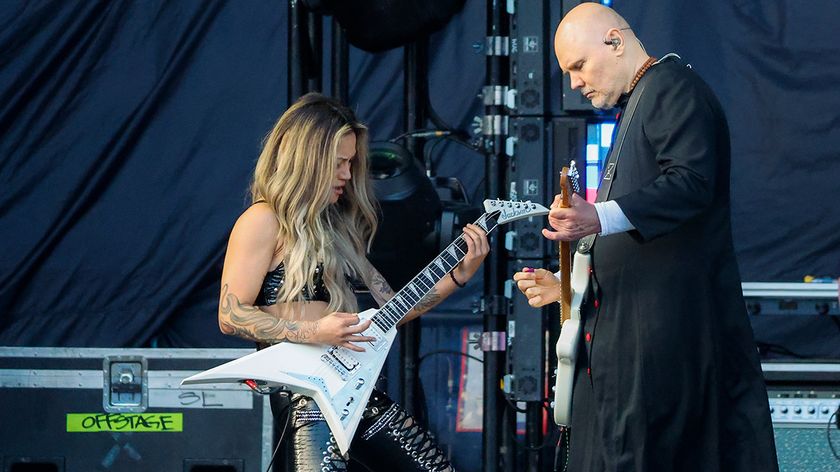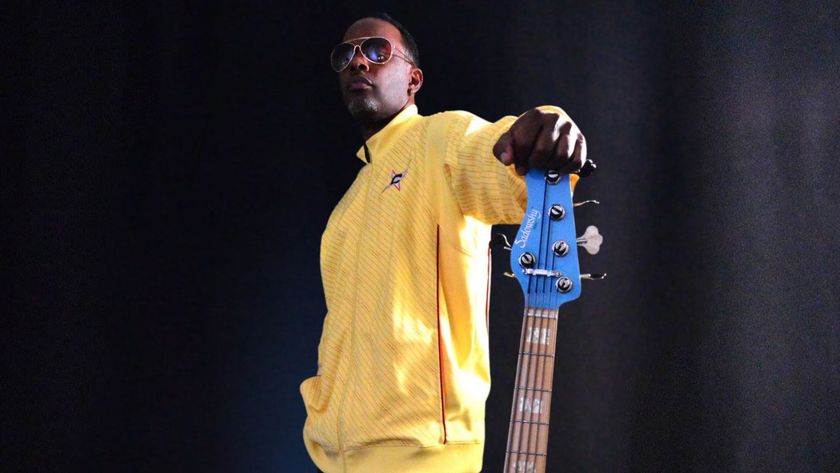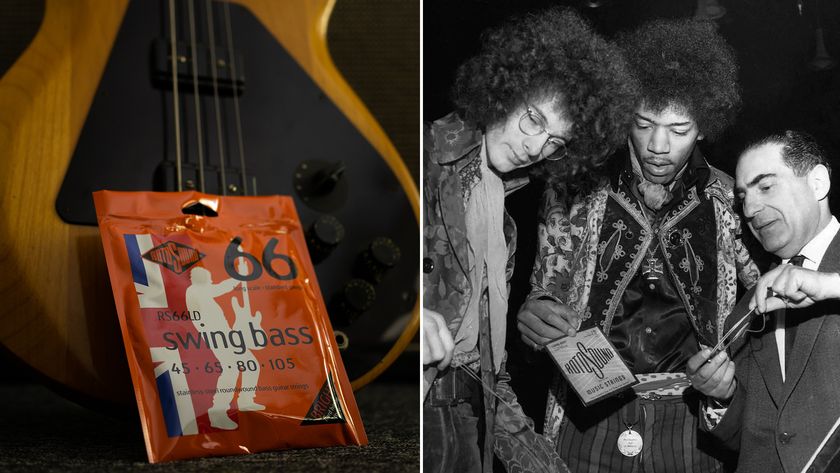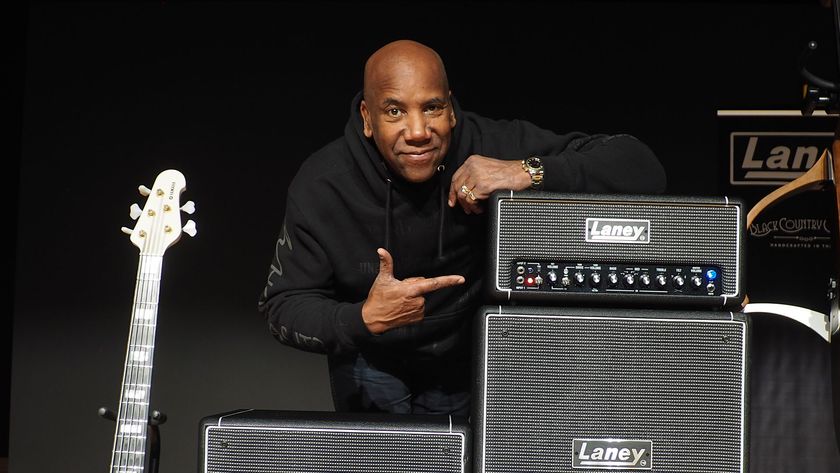Interview: Ted Nugent on Performing with The Les Paul Trio at Iridium in New York City

It's a Monday night in May at a packed Iridium Jazz Club at Broadway and 51st Street in New York City.
The Les Paul Trio has just finished a set highlighted by loose, playful readings of "All of Me," "Blue Skies" and "Sweet Georgia Brown."
But the evening is still young, and just before the last piano flourish fades into the din, the Trio is joined on stage by a grinning, Les Paul-toting Ted Nugent, the Motor City Madman himself. After thunderous applause, he and his guitar launch into a solo instrumental take on "The Star Spangled Banner."
Like the man himself, it is loud and to the point.
"I think we're gonna pay tribute to Les Paul tonight," says Nugent from the Iridium stage, where Les Paul performed every Monday night from 1996 until his passing in 2009. "I pay tribute to Les Paul every night."
And so begins a hard-rocking set by Nugent, backed by Les Paul's jazz trio — Lou Pallo on guitar, Neil Jason on bass (filling in for Nicki Parrott) and John Colianni on piano, with special guest Anton Fig on drums. After jamming on "Route 66" and "Johnny B. Goode," Nugent straps on his trademark Gibson Byrdland, and the band kicks it into overdrive with a string of pure Nugent rock, including "Stranglehold," "Cat Scratch Fever" and "Stormtroopin'."
Since Paul's death, the Trio has honored him by continuing Les Paul Mondays, and special guests have included Steve Miller, Robert Randolph, Jennifer Batten and, of course, Nugent. Jeff Beck's recent "Rock 'n' Roll Party: Honoring Les Paul" CD/DVD and subsequent Iridium Tour only help cement the club's reputation as the city's — if not the country's — new home of the guitar.
Get The Pick Newsletter
All the latest guitar news, interviews, lessons, reviews, deals and more, direct to your inbox!
"Guitar is in our DNA now because of Les Paul," says Ron Sturm, the Iridium's owner. "Everyone has been affected by Les, whether they know it or not, and the best guitarists in the world — from all genres — are lining up to honor him here. Ted Nugent flew across the country to honor Les. He really took it seriously."
I sat down with Nugent early the next morning — way too early for most rock stars — at his hotel in Times Square.
You said you pay tribute to Les Paul every night, so I assume he was a major influence. How and when did you absorb his music, and who were some of your other early influences?
I started playing when I was 6 or 7 and took lessons when I was 8 or 9. But it was all the eruption of what Les Paul had electrified three years before I was born. I was in the eye of the storm. Then we saw what Chuck Berry and Bo Diddley showed us, and we white snotty-nosed kids in Detroit were gloriously bombarded by guys like Little Richard, Duane Eddy, The Ventures, Dick Dale and Elvis with James Burton. How could you escape that? What young person doesn't crave that defiant soundtrack? So I just swan-dived into it — and here I am, swan-diving into it!
Did you know Les?
We tinkled a little bit at NAMM one time and played a couple of licks at the Gibson booth, and that was inspiring, but we really never got the chance to chat.
Guitar players are lining up to play the Les Paul Mondays at the Iridium. Why is it so popular with the guitar community?
It's all about the guitar adventure and the musical interplay. The Iridium is admitting there's a huge audience for that. The people in charge at the Iridium are music maniacs; they love musical warriors, which that stage was wall-to-wall with last night. It's not about hits, it's not about popular genres or ever-changing musical styles. It's about heart and soul. Jeff Beck is an unmovable landmark of that, Les Paul was an unmovable landmark of that, I'm a fucking unmovable landmark of that, Anton Fig is, Lou is, John is, Neil is, Carmine Appice, Eric Johnson — all my buddies. We love that there's a place where you can let your hair down. I walked onto that stage with my street clothes and I let it rip. I think letting it rip is why my music is still relative to so many people. They love that shit kicker.
Lou Pallo said the band rehearsed for about 35 minutes, yet the songs seemed to be connected by variations on a familiar bluesy riff. How did the set list come together?
Like everything else, it was spontaneous and random. I thought it would be interesting for the audience to see that the "Route 66" line, which turned out to be the "Sharp Dressed Man" line, which is "Stormtroopin'" upside down, which is "Stranglehold" in half time, with a little bit more chord flurry in the chord changes, which is "Cat Scratch Fever," which is a derivative of "Honky Tonk." I thought the audience might need to know that.
The whole band really opened it up and explored the boundaries of the songs through some serious jams. Did you intentionally keep it loose as a nod to the jazz guys on stage?
My overview was, "What can I create up there to let these guys step out — things that would be fun for them?" All those guys are motherfuckers; Anton Fig — you gotta be kidding me — and Lou, and Neil and John. I'm a lucky guitar player. We were Lewis and Clarke in that sense. When I was doing all those feedback things with the Byrdland — you'll never hear that again. And John was wailing on the piano — and I mentioned how I hate keyboards — it was cute. I even rubbed his head, made a wish. That's the camaraderie. He didn't take offense because he knew I revered what he did.
And those guys punched my ass all night. I'm picking — Whoa, Neil just did something there; I’m going to do it with him next time. And he did, and I did — magic. And there's Lou over there from the old school, and he just said, "Yeah, motherfucker, but watch this!" My time on stage last night was more of a fan than a player.
You're so closely associated with the Gibson Byrdland, yet you started off the show with a black Les Paul. What's the story with that particular guitar? Is it one of yours?
I usually use my hollow-body PRS for "The Star Spangled Banner," but because it was a Les Paul moment, I decided to play it with a Les Paul. I have an arsenal of Les Pauls to die for. I have a pair of '59s that play themselves. But Gibson got us a nice black Les Paul to play. It was fascinating, because the Byrdland has a teeny-tiny, 3/4-style neck. I mean it's petite, and I have small hands. And that Les Paul last night, it was the biggest neck I've ever played. Maybe that's why my hand hurts this morning! It was Sequoia R Us. You play different with that size neck. You play some greasier stuff, because you have more room, more breadth on the neck for vibrato. So yeah, I love it all, but the Byrdland — he's my boy.
When you pulled out the Byrdland, the vibe changed. Is that because you're just so connected to it — so familiar with the moodiness of a loud hollow-body Gibson?
There's a passage, I think it was in "Stormtroopin'," then a little bit in "Stranglehold," where I'm playing all this feedback, and that Byrdland is just biting your fucking soul. All these noises, and John's over there, just inebriated, because he's never played piano over that. The only way you can get that or anything close to that movement is if somebody with a cello does (makes buzzing sound), and the way you touch the strings — and then you can't make the bow go long enough. It's 2011, and I did something that's never been done before. I don't know if that's possible anymore unless you plunge yourself into uncharted territories, intentionally seek to find a place where you will make a musical mistake, and when you do, it's beautiful. Because it's defiant, dissonant, but it makes sense.
What's the vintage on that Byrdland of yours?
That one last night is a '66. But I think I have 19 Byrdlands. They go from '61 to a beautiful instrument Gibson made me for my 60th birthday, which is insane gorgeous. It's got this minimal finish so that the spruce breathes more. And I took a blowtorch to it — and everybody was like, "You're going to do what?" I burned some of the grain, so the grain, when it curls, the spruce grain sticks up. It's a stunning instrument with brass hardware. And I've got one that's all white. It's like "The Great White Buffalo." My arsenal of Byrdlands is to die for. And if you fuck with them, you will die.
It really looked like you had a lot of fun last night.
If you're not motivated to play guitar by fun and that uppity, defiant-spirited factor, you'll never reach your potential. It isn't about technique, it isn't about notes. That's all secondary. Way secondary. The most impacting notes and technique are going to come because you're inspired by a positive energy. And those guys, they kept hugging me after the show, because they realized their musical lives are, well, they probably qualify as fun, but not that much fun. I'm just too much fun. And that's why at 63 years of age, I'm a dangerous motherfucker.











Damian is Editor-in-Chief of Guitar World magazine. In past lives, he was GW’s managing editor and online managing editor. He's written liner notes for major-label releases, including Stevie Ray Vaughan's 'The Complete Epic Recordings Collection' (Sony Legacy) and has interviewed everyone from Yngwie Malmsteen to Kevin Bacon (with a few memorable Eric Clapton chats thrown into the mix). Damian, a former member of Brooklyn's The Gas House Gorillas, was the sole guitarist in Mister Neutron, a trio that toured the U.S. and released three albums. He now plays in two NYC-area bands.
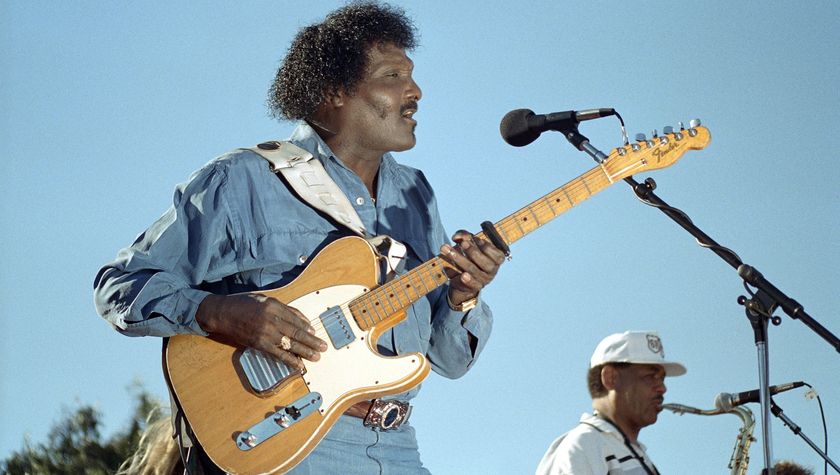
“Freddie King would ask me why I never tried using thumbpicks – I just couldn't play with one”: He took Jimi Hendrix's place in Little Richard's band, was idolized by Stevie Ray Vaughan, and is one of the most overlooked Telecaster slingers of all time

“If any song can unite all generations of rock guitar fans, this is it”: March 2025 Guitar World Editors' Picks
